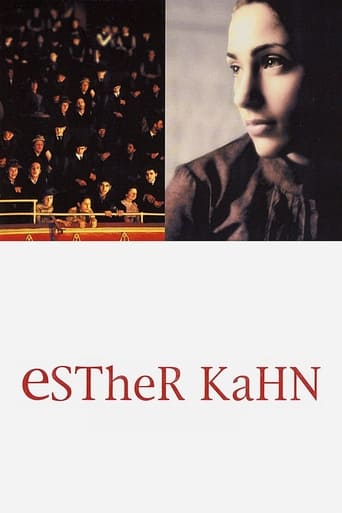ora-gavriely
A masterpiece.Thus it is, possibly, not for everyone.The camera work, acting, directing and everything else is unique, original, superb in every way - and very different from the trash we are sadly used to getting.Summer Phoenix creates a deep, believable and intriguing Esther Kahn. As everything else in this film, her acting is unique - it is completely her own - neither "British" nor "American" nor anything else I have ever seen. There is something mesmerizing about it.The lengthy, unbroken, natural shots are wonderful, reminding us that we have become too accustomed to a few restricted ways of shooting and editing.
julieart
A shame that even a talented director, Desplechin, could not muster a decent performance out of a bleakly-talented actress, Phoenix, Esther Kahn lacks the substance to convey a very concise and clear plot. In an attempt to fulfill the concentric circle of an actor's plight, the performance and presentation is too contrived and poorly executed to draw any compassion from the viewer. In an overly long running time, the redundancy of Esther's struggle is too melodramatic to be effective and reduces the storyline into a frail frame of a disastrous display. The content is incoherent and gratuitous as Phoenix struggles to carry out Desplechin's instruction, just as Esther is supposedly trying to do the same. Never feeling a convincing victory over Esther's pain, we never feel a victory in Phoenix's talent.
cranesareflying
This is an extremely dense, somber, and complicated film that unravels quite slowly, revealing excruciating detail, like the attention paid in a novel, and watching this film "IS" like watching a novel unfold. While I didn't care for the narrator, as I felt he was out of balance with the rest of the performances, this film features some of the best ensemble acting I have ever seen, and the lead, Summer Phoenix, is fabulous. Her innocence and naivete some might find implausible, sort of a cross between Cinderella and Alice in Wonderland. I can buy that critique, but she's still fabulous, partially because she's unlike anything I've ever seen before.This film is unbelievably beautiful, filmed by Eric Gautier, and part of what is so unique about this film is how it doesn't ever show what you'd expect. It's always surprising, and despite it's length, the film never reveals more than it needs to. At 163 minutes, it's extremely concise, to a fault, I'd say, which is one of the wonders of this film. It's filled with brief moments which are simply stunning, some of the best you're likely to see all year, and all these moments add up in the end to an extraordinary film experience. The family moments are unique, Ian Holm is brilliant, and what this film has to say about the theater hasn't been seen in films since Cassavetes' "Opening Night," or perhaps Chaplin's "Limelight." But, believe it or not, this film is much "less" conventional. I never knew where this film was going, and now, having seen it, it still has multiple possibilities. This is a powerful, incredibly provocative film.
gans
The point of the vastly extended preparatory phase of this Star is Born story seems to be to make ultimate success all the more sublime. Summer Phoenix is very effective as an inarticulate young woman imprisoned within herself but never convincing as the stage actress of growing fame who both overcomes and profits from this detachment. Even in the lengthy scenes of Esther's acting lessons, we never see her carry out the teacher's instructions. After suffering through Esther's (largely self-inflicted) pain in excruciating detail, we are given no persuasive sense of her triumph.
The obsessive presence of the heroine's pain seems to be meant as a guarantee of aesthetic transcendence. Yet the causes of this pain (poverty, quasi-autism, Judaism, sexual betrayal) never come together in a coherent whole. A 163-minute film with a simple plot should be able to knit up its loose ends. Esther Kahn is still not ready to go before an audience.


